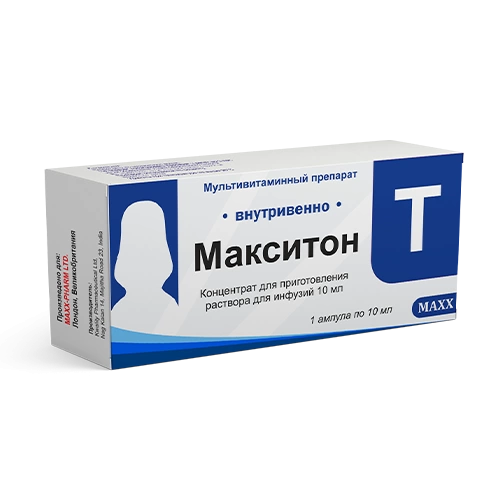Maxiton-T
Category:
The drug Maxiton - T is a combination of fat-soluble and water-soluble vitamins in an aqueous solution. Neurotropic B vitamins have a beneficial effect on inflammatory and degenerative diseases of the nervous system and musculoskeletal system; in high doses they have analgesic properties, increase blood flow and normalize the functioning of the nervous system and the process of hematopoiesis. This complex of vitamins has a catalytic effect on carbohydrate metabolism and is necessary for the normal functioning of the central nervous system, thyroid gland, liver, hematopoietic organs, and gastrointestinal tract.
10 ml of solution contains:
- active ingredients: pyridoxine hydrochloride 25 mg, thiamine hydrochloride 80 mg, cyanocobalamin 0.800 mg, retinol palmitate 15000 IU, riboflavin 10 mg, nicotinamide 125 mg, dexpanthenol 30 mg, ergocalciferol 1000 IU, dl-alpha-tocopherol a acetate 10 mg.
- excipients: benzyl alcohol, gentisic acid ethanolamide, polysorbate 80, water for injection.
Excipients: benzyl alcohol, gentisic acid ethanolamide, polysorbate 80, water for injection.
- Before and after operations (to prepare for surgery and improve the regeneration of soft tissues and nerve endings);
- For gastrointestinal diseases (cholecystitis, pancreatitis, ulcerative colitis, enteritis, gastritis, gastric ulcer) to restore and regenerate damaged gastrointestinal mucosa, as well as to maintain normal secretory and kinetic function of the intestine;
- Hepatitis, liver cirrhosis;
- Polyneuritis, neuralgia, diabetic polyneuropathy;
- Various fractures and osteoarticular pathology, to improve phosphorus-calcium metabolism (for the regeneration of soft tissues and nerve endings after extensive injuries);
- Anemia (to enhance hematopoiesis);
- Asthenic syndrome, chronic fatigue syndrome;
- Recovery period after infectious diseases;
- Long-term use of contraceptives;
- Chronic hypo- and vitamin deficiency or increased need for vitamins (with hyperthyroidism, alcoholism, intoxication, poor nutrition, diet);
- Chronic non-healing wounds;
- Male and female infertility, to improve spermatogenesis and egg maturation;
- Patients on dialysis;
- Skin diseases accompanied by dryness and impaired trophism and hyperkeratosis (psoriasis, vitiligo, trophic ulcers, eczema, lichen, etc.), hair loss;
- In geriatrics, elderly patients as a drug of choice.
Directions for use and dosage: For intravenous infusion only! The daily dose administered depends on the patient's age:
- from 3 to 6 years – 2 ml of the drug diluted in 100 ml of 0.9% sodium chloride solution or 5% dextrose solution;
- from 6 to 12 years – 5 ml of the drug diluted in 250 ml of 0.9% sodium chloride solution or 5% dextrose solution;
- from 12 to 16 years – 10 ml of the drug diluted in 500 ml of 0.9% sodium chloride solution or 5% dextrose solution;
- from 16 years and older 10 ml – 20 ml of the drug diluted in at least 500 ml of 0.9% sodium chloride solution or 5% dextrose solution.
The duration of the infusion should be at least 30 minutes. The duration of treatment depends on the assessment of the patient's clinical status. The recommended course of treatment is carried out for two weeks. If necessary, the course of treatment can be extended for a period of no more than three weeks.
Call center
We are always ready to answer your calls or messages, we will be happy to cooperate with you.
